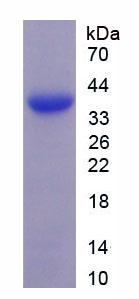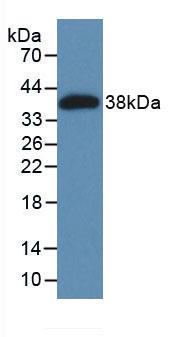Active Microfibrillar Associated Protein 2 (MFAP2)
MAGP1; Microfibril-associated glycoprotein 1
- Product No.APC618Hu01
- Organism SpeciesHomo sapiens (Human) Same name, Different species.
- Buffer FormulationPBS, pH7.4, containing 0.01% SKL, 5% Trehalose.
- Traits Freeze-dried powder
- Purity> 95%
- Isoelectric Point5.5
- ApplicationsCell culture; Activity Assays.
- DownloadInstruction Manual
- UOM 10µg50µg 200µg 1mg 5mg
- FOB
US$ 346
US$ 864
US$ 1728
US$ 5184
US$ 12960
For more details, please contact local distributors!
ACTIVITY TEST

Microfibrillar-associated protein 2 (MFAP2) is an O-glycosylated protein which excreted to the extracellular space and the extracellular matrix. MFAP2 combine biglycan and elastin to form a ternary complex. MFAP2 plays a key role in the support and distensibility of the juxtacanalicular region of these collector channels. It also can inhibit LTB-1 binding to fibrillin-1, stimulate the phosphorylation of Smad2, and thereby mediate the subsequent extracellular deposition of latent TGFbeta. Besides, Fibrillin 1 (FBN1) has been identified as an interactor of MFAP2, thus a binding ELISA assay was conducted to detect the interaction of recombinant human MFAP2 and recombinant human FBN1. Briefly, MFAP2 were diluted serially in PBS, with 0.01% BSA (pH 7.4). Duplicate samples of 100uL were then transferred to FBN1-coated microtiter wells and incubated for 2h at 37℃. Wells were washed with PBST and incubated for 1h with anti-MFAP2 pAb, then aspirated and washed 3 times. After incubation with HRP labelled secondary antibody, wells were aspirated and washed 3 times. With the addition of substrate solution, wells were incubated 15-25 minutes at 37℃. Finally, add 50µL stop solution to the wells and read at 450nm immediately. The binding activity of MFAP2 and FBN1 was shown in Figure 1, and this effect was in a dose dependent manner.
USAGE
Reconstitute in ddH2O to a concentration ≤0.1mg/mL. Do not vortex.
STORAGE
Avoid repeated freeze/thaw cycles. Store at 2-8°C for one month. Aliquot and store at -80°C for 12 months.
STABILITY
The thermal stability is described by the loss rate. The loss rate was determined by accelerated thermal degradation test, that is, incubate the protein at 37°C for 48h, and no obvious degradation and precipitation were observed. The loss rate is less than 5% within the expiration date under appropriate storage condition.
GIVEAWAYS
INCREMENT SERVICES
-
 BCA Protein Quantification Kit
BCA Protein Quantification Kit
-
 Molecular Mass Marker for Protein
Molecular Mass Marker for Protein
-
 Monoclonal Antibody Customized Service
Monoclonal Antibody Customized Service
-
 Polyclonal Antibody Customized Service
Polyclonal Antibody Customized Service
-
 Protein Activity Test Experiment Service
Protein Activity Test Experiment Service
-
 Electrophoretic Mobility Shift Assay (EMSA) Experiment Service
Electrophoretic Mobility Shift Assay (EMSA) Experiment Service
-
 Buffer
Buffer
-
 Lentivirus Packaging Experiment Service
Lentivirus Packaging Experiment Service
-
 Adenovirus Packaging Experiment Service
Adenovirus Packaging Experiment Service
-
 Real Time PCR Experimental Service
Real Time PCR Experimental Service
-
 Spike RBD Protein (S-RBD)
Spike RBD Protein (S-RBD)
-
 Protein G
Protein G
-
 Protein A
Protein A
| Catalog No. | Related products for research use of Homo sapiens (Human) Organism species | Applications (RESEARCH USE ONLY!) |
| RPC618Hu01 | Recombinant Microfibrillar Associated Protein 2 (MFAP2) | Positive Control; Immunogen; SDS-PAGE; WB. |
| APC618Hu01 | Active Microfibrillar Associated Protein 2 (MFAP2) | Cell culture; Activity Assays. |
| PAC618Hu01 | Polyclonal Antibody to Microfibrillar Associated Protein 2 (MFAP2) | WB; IHC; ICC; IP. |









